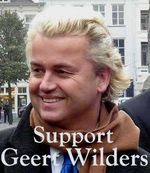Mask the Number of Islamic Radicals
In a stunning illustration of how apologists for militant Islam flat-out distort the truth, Robert Satloff writes in the Weekly Standard how John Esposito and Dalia Mogahed “cooked the books” to make their own data appear to show there were only a small percentage of “radical” Muslims worldwide.
Esposito and Mogahed make the claim that only 7% of Muslims worldwide are “radical.” That amounts to about 91 million Muslims. No small number.
But a closer examination of their data reveal that the number of those who are “radical” is actually at least twice that many, and more likely three to four times that many – or between 300 million and 480 million Muslims worldwide!
To discover just how they pulled off this sleight of hand, click on the link below to read Satloff’s article.
http://www.weeklystandard.com/Content/Public/Articles/000/000/015/066chpzg.asp?pg=1
Just Like Us! Really?
Gallup says only 7 percent of the world's Muslims are political radicals. Yet 36 percent think the 9/11 attacks were in some way justified. by Robert Satloff , 05/12/2008, Volume 013, Issue 33
On the inside back cover of books published by Gallup Press there is the following breathtaking statement:
Gallup Press exists to educate and inform the people who govern, manage, teach and lead the world's six billion citizens. Each book meets Gallup's requirements of integrity, trust and independence and is based on a Gallup-approved science and research.
Don't be distracted by the bad grammar. Focus instead on Gallup's "requirements of integrity, trust and independence." Thanks to a remarkable admission by a coauthor of Gallup's new bestseller Who Speaks for Islam? What a Billion Muslims Really Think, we are now able to know precisely what Gallup's "requirements" really are.
Who Speaks for Islam? is written by John L. Esposito, founding director of Georgetown University's Prince Alwaleed bin Talal Center for Muslim-Christian Understanding, and Dalia Mogahed, executive director of the Gallup Center for Muslim Studies. As the authors state at the outset, the book's goal is to "democratize the debate" about a potential clash between Western and Muslim civilizations by shedding light on the "actual views of everyday Muslims"--especially the "silenced majority" whose views Esposito and Mogahed argue are lost in the din about terrorism, extremism, and Islamofascism.
This majority, they contend, are just like us. They pray like Americans, dream of professional advancement like Americans, delight in technology like Americans, celebrate democracy like Americans, and cherish the ideal of women's equality like Americans. In fact, the authors write, "everyday Muslims" are so similar to ordinary Americans that "conflict between the Muslim and Western communities is far from inevitable."
Similar arguments have been made before; some of this is true, some is rubbish, much is irrelevant. The real debate about the "clash of civilizations" is about whether a determined element of radical Muslims could, like the Bolsheviks, take control of their societies and lead them into conflict with the West. The question often revolves around a disputed data point: Of the world's 1.3 billion Muslims, how many are radicals? If the number is relatively small, then the fear of a clash is inflated; if the number is relatively large, then the nightmare might not be so outlandish after all.
What gives Who Speaks for Islam? its aura of credibility is that its answers are allegedly based on hard data, not taxi-driver anecdotes from a quick visit to Cairo. The book draws on a mammoth, six-year effort to poll and interview tens of thousands of Muslims in more than 35 countries with Muslim majorities or substantial minorities. The polling sample, Esposito and Mogahed claim, represents "more than 90 percent of the world's 1.3 billion Muslims." To back up the claim, the book bears the name of the gold-standard of American polling firms, Gallup.
The answer to that all-important question, the authors say, is 7 percent. That is the percentage of Muslims who told pollsters that the attacks of September 11, 2001, were "completely" justified and who said they view the United States unfavorably--the double-barreled litmus test devised by Esposito and Mogahed to determine who is radical and who isn't.
for the rest of the story: http://www.weeklystandard.com/Content/Public/Articles/000/000/015/066chpzg.asp?pg=2
Subscribe to:
Post Comments (Atom)





























No comments:
Post a Comment